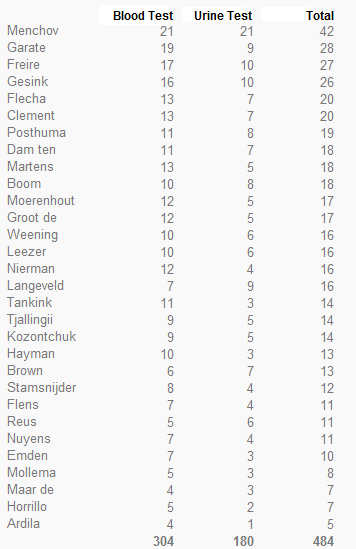 The Rabobank Team has decided to publish the various anti-doping controls members of the team underwent during the 2009 season. In total, the thirty rider roster was tested 484 times with both blood and urine samples taken.
The Rabobank Team has decided to publish the various anti-doping controls members of the team underwent during the 2009 season. In total, the thirty rider roster was tested 484 times with both blood and urine samples taken.
The team is part of the ProTour which means they must comply with the International Cycling Union's (UCI) biological passport system, which includes each rider detailing their whereabouts to the anti-doping authorities. The passport is a study over time of a rider's biological parameters that allows the UCI to detect any abnormalities that may indicate doping.
During the 2009 season the biological passport was used to successfully target suspect riders for doping controls. Italian Danilo Di Luca tested positive for Cera, a third generation EPO, during a targeted doping control at last year's Giro d'Italia. Di Luca continues to maintain his innocence in the matter.
Rabobank, like all ProTour teams, contributes 120,000 euros each year towards cycling's anti-doping efforts. "The biological passport requires an effort from everyone on the team, riders need to report their exact accommodations so they can be available for testing. The riders have been perfectly happy to do this task," explained Rabobank's general manager Harold Knebel.
During the 2009 season the Dutch team submitted 304 urine tests and 180 blood tests to anti-doping officials. The team averaged 16 tests per rider, with 2009 Giro d'Italia winner Denis Menchov, triple World Champion Oscar Freire, Dutch up and comer Robert Gesink and Spanish climber Juan Manuel Garate among the most tested.
Test Summary:
